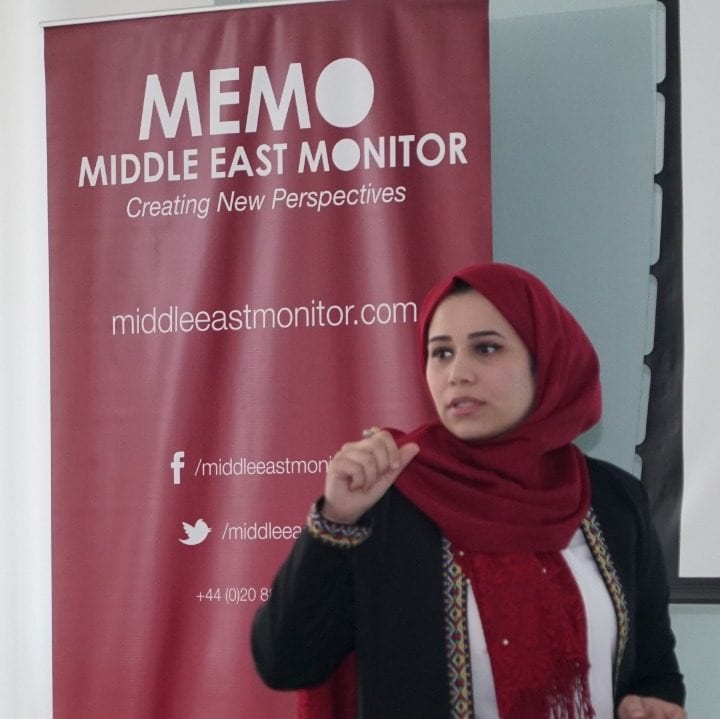Following the ongoing saga of the US presidential election over the past few weeks, it occurred to me that I am 30 years old and have never voted in my country of birth, Palestine. In Gaza, where I was born and lived for 25 years, the last election was in 2006, and I was too young to vote. No elections have been held in the occupied Palestinian territories since then, despite the politicians’ promises.
People cast their votes for many reasons: their support for or opposition to party policies, for example; or to back a particular candidate or issue; or simply send a message to the government, one way or the other. Or it may even simply be because you want to exercise your democratic right. Free and fair elections are necessary to build democracy, but what if they aren’t held in your country? What if the prevailing political culture, economic and social circumstances, and, in my case, a military occupation prevents such elections taking place? That is the situation in occupied Palestine and Arab countries generally.
Watching the TV news from the US and noting the votes cast, the number of seats and the names of victorious candidates, I have been led to wonder when I might be able to do the same thing for my own country. Not just once in a lifetime, if I am lucky, but regularly. I have seen George Bush, Bill Clinton, George W Bush, Barack Obama and Donald Trump enter the White House; and now Joe Biden is President-elect. Regular democratic elections are meant to widen political participation and ensure that countries do not have “leaders for life”.
The presidential election in Palestine has not been held since 2005; the legislative election has not been held since 2006, when Hamas won. This was accepted neither by Fatah nor Israel and its allies, so even today the Fatah-led Palestinian Authority controls the West Bank and has nominal control over the Gaza Strip, where Hamas is the de facto government. In 2007, the Palestinian Islamic Resistance Movement foiled an Israeli-backed coup attempt by a faction within Fatah, since when the occupation authorities have imposed a land, sea and air blockade on Gaza. President Mahmoud Abbas — whose term of office actually expired in 2009 — has suspended all elections ever since.
Recently, Fatah and Hamas met in Turkey and announced that they had agreed to hold Palestinian elections in the coming months, raising hopes that the political division was over. However, similar agreements were put together in Makkah (2007), Sana’a (2008) and Cairo (2011, 2012, 2014), but haven’t been implemented.
Will 2021 be the year that the people of Palestine have the opportunity to vote for their leaders and rebuild broken trust? My optimism is tempered by the obstacles in the way. Israel will always try to block the Palestinians from uniting, and is able to prevent the people from getting to and from polling stations. It is already known to be against allowing the Palestinians in occupied East Jerusalem to particpate in any elections, and will work to prevent any Palestinian democracy taking shape if it doesn’t like the voters’ decision.
Across the Arab world we can see elections taking place which are basically meaningless exercises because no viable opposition is allowed and the results are predetermined. Lip-service might be paid to democracy but everyone knows that the purpose is simply to gloss over the fact that the “winners” are dictators. Ever since their nominal independence from colonial rule, Arab regimes have generally been characterised by varying forms of authoritarian rule. When the Arab Spring uprisings prompted some changes, the threat was too great for the dictatorships and they conspired in a counter-revolution to overthrow the nascent democracies that had emerged.
The 2019-2020 Arab Opinion Index, used 900 researchers to survey nearly 30,000 Arab individuals on their opinions about Public Attitudes towards Democracy. The poll result suggests that 39 per cent of the citizens in the Arab region define democracy as a guarantee of political and civil freedoms, while 20 per cent believe that democracy is a guarantee of equality and justice among citizens; 14 per cent focused on participation in the institutional aspect of a democratic system. According to Arab Opinion Index, 57 per cent of those polled said that their priorities are economic. It seems that average Arab citizens restrict the definition of democracy to those who can provide them with a reasonable living.
What statements do you support on democracy?#ArabOpinionIndex 2019/2020 pic.twitter.com/veouepf2B1
— Arab Center (@ArabCenter_en) October 6, 2020
On 15 November, I actually got a taste of what it is like to cast my vote, when I participated in the municipal council elections in Brazil, where I now live and have citizenship. For the first time, I feel empowered, knowing that my vote matters. As Abraham Lincoln, the 16th President of the US, once said, “The ballot is stronger than the bullet.”
READ: Israel PM’s son likens Kibbutz movement to Nazi Germany
One of the most important rights of any citizen in any country is the right to vote. Voting is compulsory in Brazil; one of the first things you when applying for citizenship is to fill out your electoral details.
That right has been stolen from me in my home country of Palestine. However, while it is important for free and fair elections to take place in Palestine and the wider Arab world, what is even more important is for the results and voters’ wishes to be respected, not only by the sitting leadership, but also by countries around the world. Only then will our governments have the degree of legitimacy that is essential for progress.
The views expressed in this article belong to the author and do not necessarily reflect the editorial policy of Middle East Monitor.

![Brazilian electronic ballot box, 3 November 2020 [Government Brazilian Agency]](https://i0.wp.com/www.middleeastmonitor.com/wp-content/uploads/2020/11/BRAZIL.jpg?fit=920%2C613&ssl=1)







